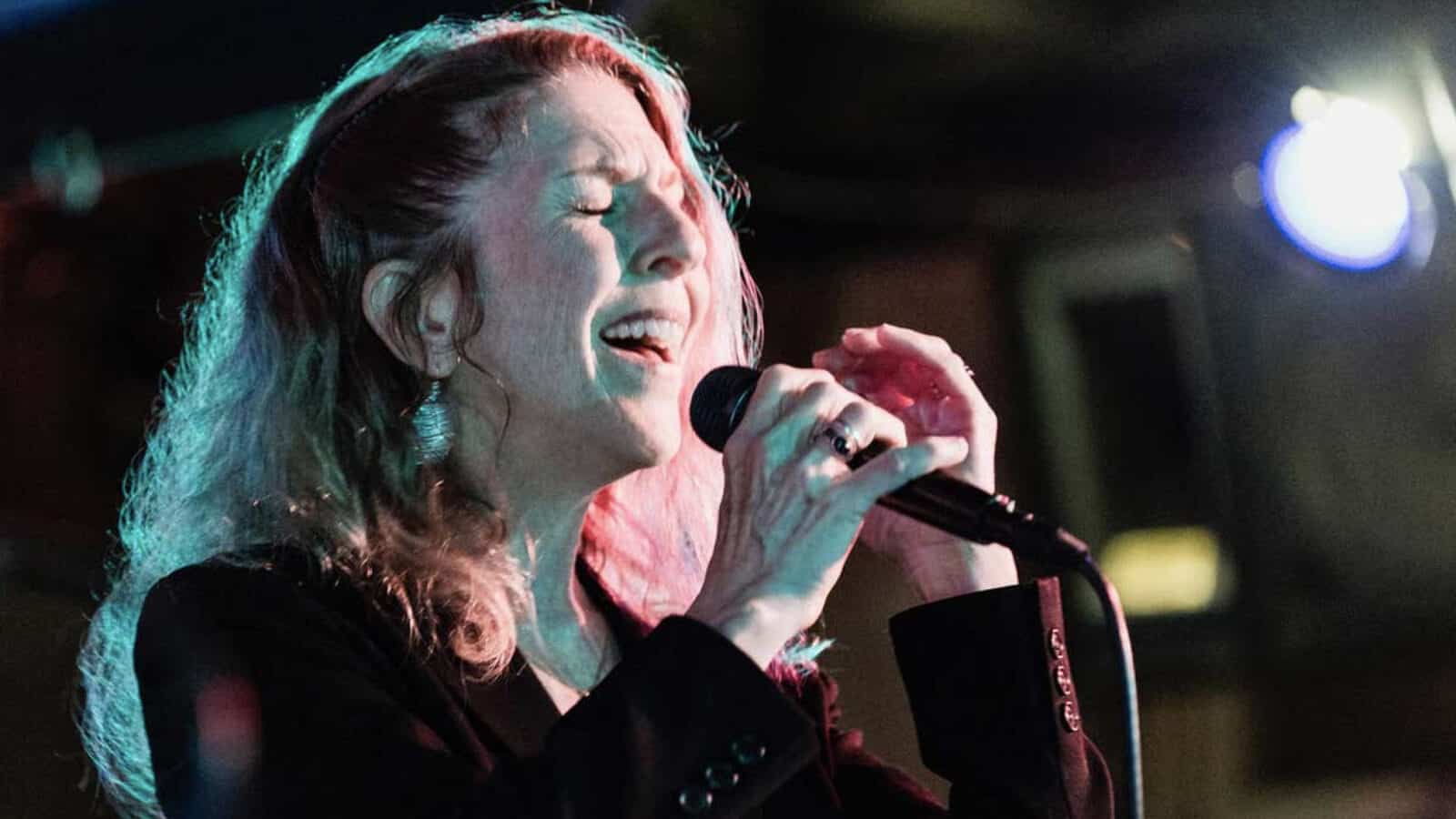In a place in Lisbon called Alfama, you can walk near the sea, outside of the main part of the city, on small windy streets with apartments and restaurants. It is the oldest neighborhood in the city, named in Arabic for baths, fountains, hot springs — a place of steep hills, red roofs and bright ceramic tiles.
And in a bar or a backstreet restaurant you can hear melody swaying over a 14-stringed guitar and a rapid bass. An oral tradition has lived here for hundreds of years, says internationally acclaimed jazz bassist Mary Ann McSweeney. She came here searching for Fado, a Portuguese folk tradition of music and dance.
It’s people’s music, she said, and she has learned they are her people, as their music interacts in many ways with her own.
This weekend she will perform that fusion with her band, the Urban Fado Project, at LuluFest Lenox, a jazz festival highlighting women leaders and their ideas of the music — setting it apart, the founders say, from most other festivals in the country — and the world.
The festival has a longer history; this is its first year here, but the 20th in the U.S. Director and jazz pianist Peggy Stern founded the annual celebration in Kingston, N.Y., as the Wall Street Jazz Festival, and ran it there for 12 years, then moved to Austin, Texas, for seven, renaming it for Fats Waller’s jazz standard Lulu’s Back in Town.
In Austin she met jazz vocalist Suzi Stern (they’re not related but longtime friends), and Suzi Stern has joined her as producer and director as they bring the festival to Lenox this summer, with McSweeney and Grammy nominated jazz violinist Sara Caswell.
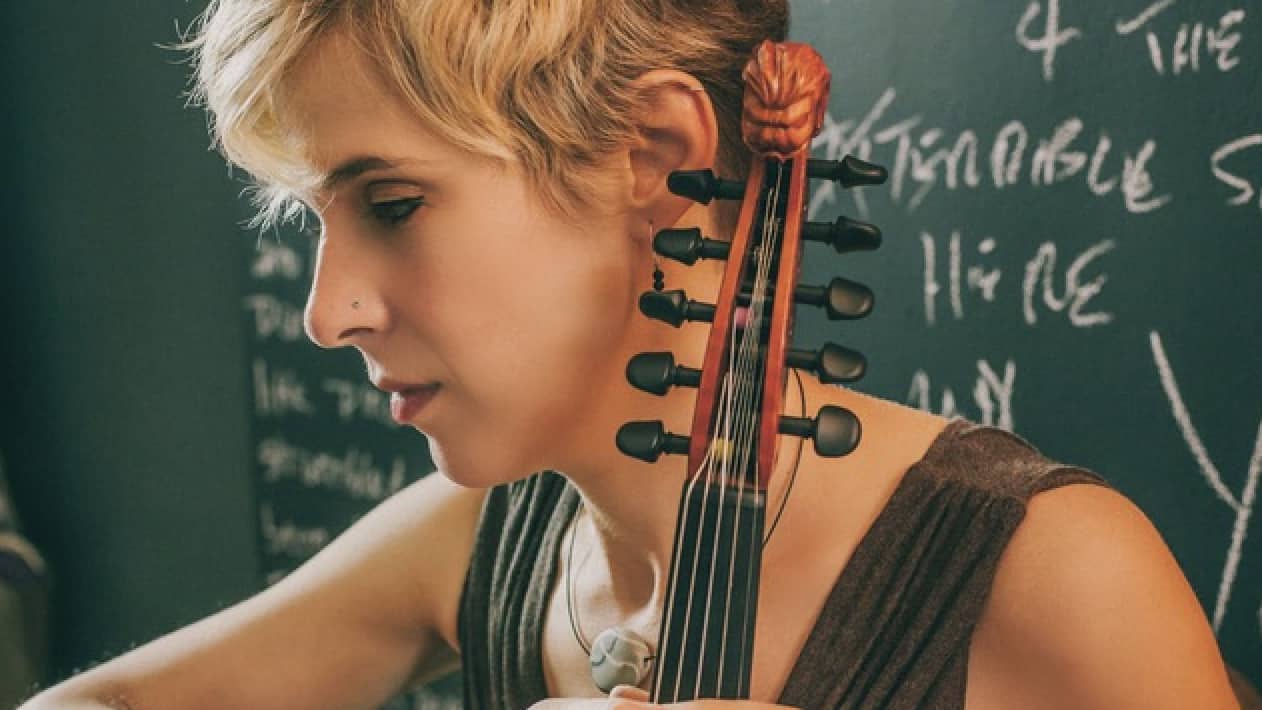
Grammy nominated jazz violinist Sara Caswell sits with her instrument against a green chalkboard. Press photo courtesy of Lulufest
“I’m very excited that this is the first annual festival,” McSweeney said. “I can’t believe it’s happening. It’s great — I mean, Suzi’s great, and I know Peggy’s awesome. … It’s awesome because a lot of the festivals, if you look at the lineup, it’s mostly men, except for maybe a singer or two. It’s still like that. And those men, some of them are friends of mine.”
She laughed with a wry irony. While she performs with and respects many men jazz musicians, she said, she also performs in a world where people regularly assume a woman can’t play the bass even when she walks on stage carrying her own.
She has seen a shift toward broader ideas, a slow movement but an ongoing one. She mentors and teaches musicians, many of them women, and she sees more diverse musicians in ensembles and orchestras, more programs offering mentorship, more women producing concerts and choosing musicians, like the ensemble she is performing with now on Broadway in the musical Some Like It Hot.
“We have a woman lead alto, a woman lead trombone, lead trumpet, me on the bass — that’s the first time in history,” she said.
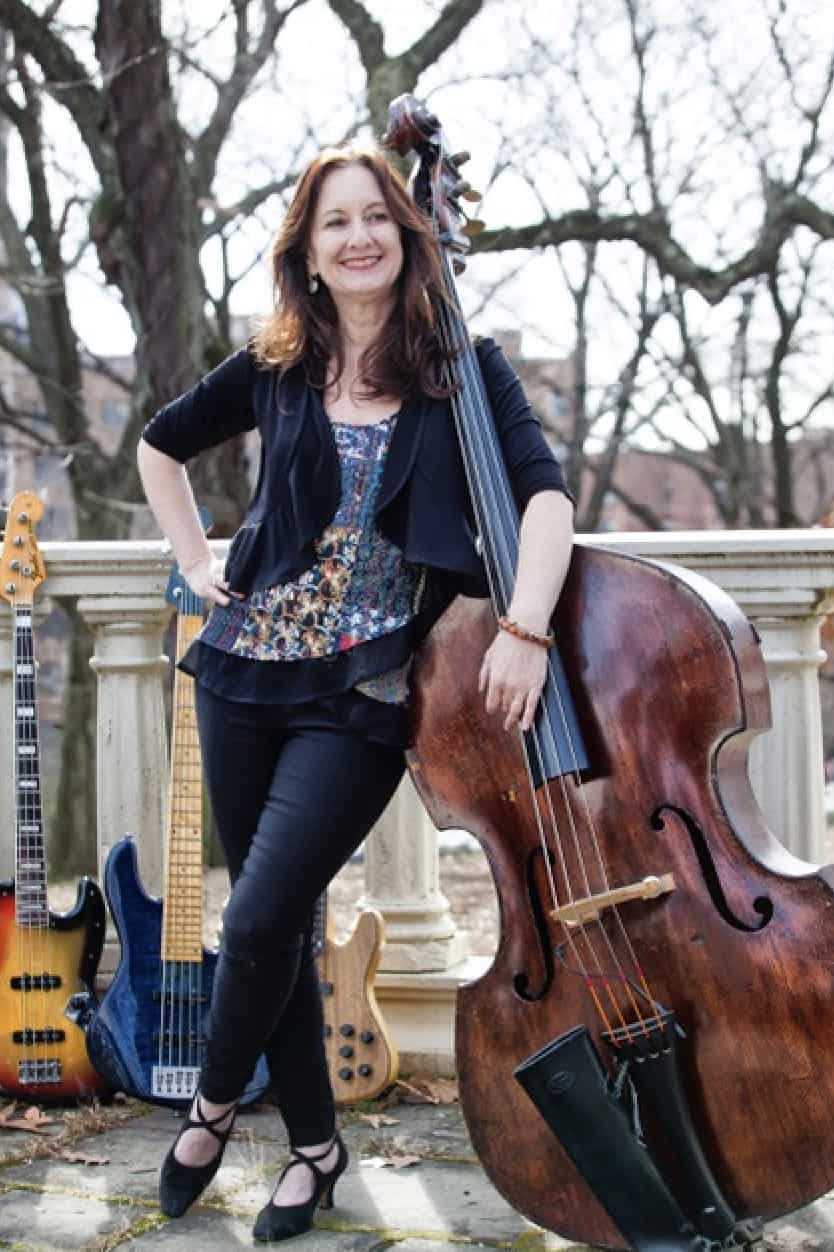
Internationally acclaimed bassist Mary Ann McSweeney leans an arm on her instrument. Press photo courtesy of the artist
LuluFest Lenox
July 15 —Full Lineup — Elayne P. Bernstein Theatre at Shakespeare & Company
7 p.m. — Mary Ann McSweeney Urban Fado Project — Bassist and leader Mary Ann McSweeney, Jason Ennis on guitar, Todd Isler on drums and Sara Caswell on violin
8 p.m. — The Peggy Stern Quartet — renowned pianist and LuluFest Founder/Director Peggy Stern, Paul Ostermayer on sax and flute, Lew Scott on bass and Peter O’Brien on drums
9 p.m. — The Sara Caswell Quartet with Grammy nominated jazz violinist Sara Caswell, Jesse Lewis on guitar, Ike Sturm on bass, Jared Schonig on drums
The festival runs in collaboration with Berkshires Jazz, Inc. and The Ritenuto Foundation.
And so she welcomes a place like Lulu Fest, where women can compose their own music, play their own instruments and follow their own passion and excitement wherever they choose.
For her, Fado has given inspiration since she first discovered the music, close on 10 years ago. In 2015, she said, she performed with her jazz group in Lisbon, in the Sexial Jazz Festival.
“And I loved the country,” she said. “I loved the people. I felt very connected to Portugal.”
Fado means fate, she says. The music tells stories about people’s lives, and the sound is often melancholy and sometimes holds a higher energy. It’s a music of working people, bohemian, navigating loss and fear and unpredictable forces, singing in taverns along the shore.
She came home wondering what musical traditions the Portuguese have equivalent to jazz and blues, she said. Back in Brooklyn she started researching, and the sound of Fado moved her more than she could explain. But on this side of the Atlantic, the music seemed rare.
“There’s no live Fado music really in New York,” she said. “… and hearing this music, I burst into tears. First time I heard it live, I burst into tears.”
“… I was loving Fado. I went to Fado concerts in New York when Marisa would play at Carnegie Hall. I would go when Dolce Pontes would play at town hall. I tried to go out as much as I could.”
She found informal jams, seeking out a family of Portuguese American musicians in Newark, New Jersey — sharing Easter dinner before people gathered and stood up to sing.
And then she learned that the music ran closer than she knew. She had heard some family lore that her family might have some Portuguese roots, she said. But as far as she knew, as a McSweeney, she has Irish ancestry, and her mother and grandmother are Croatian.
‘There’s no live Fado music really in New York … and hearing this music, I burst into tears. — Mary Ann McSweeney
Then a few years ago, moving from Brooklyn to the Bronx, she found a box of family papers she had never opened — and learned that her great great grandparents had come from the Azores, islands off the coast of Portugal. She has their photographs now.
“… I was stunned,” she said. “There’s something about the music, and my great-great grandparents are from an island called San Miguel … you know, there’s a connection there.”
Even before she found that tie, she was writing music with a flavor of fado, arranging music, sending her jazz group recordings of fadistas (singers) like Amália Rodrigues, who performed around the world.
Sometimes McSweeney will perform with a vocalist singing wordlessly, she said (and she has begun to study Portuguese). More often she plays with the melodies and the forms and the chord changes, and she opens up the sections for improvisation.
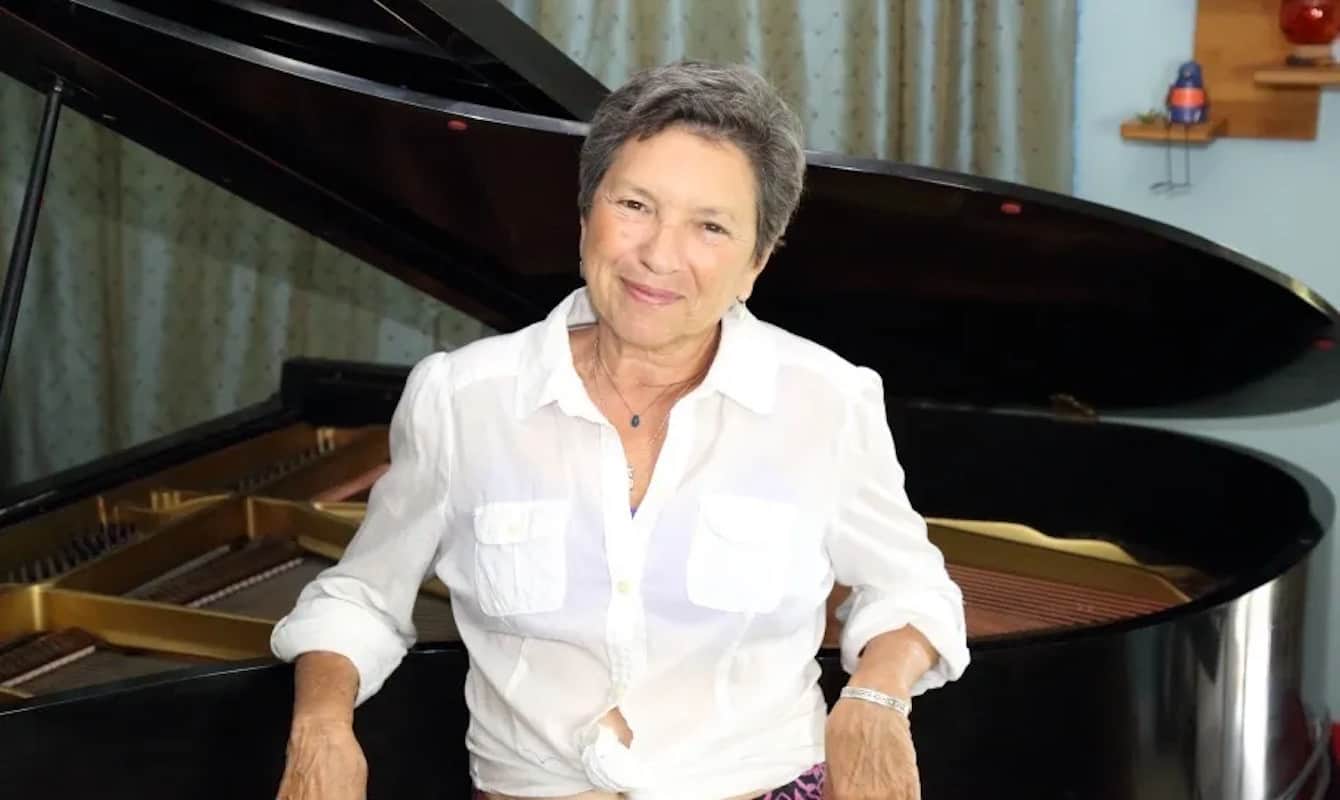
Jazz pianist Peggy Stern sits on a bench by her instrument, smiling. Press photo courtesy of Lulu Fest.
In traditional fado, a 12-stringed guitar will play with a bass guitar — maybe three guitars and a singer. But now the more modern Fadistas are bringing in other instruments. And McSweeney has brought together her own fado jazz band.
She had heard jazz violinist Sara Caswell years before in Brooklyn, she said, and had been looking for a chance to play with her. In the Berkshires, she reached out to jazz guitarist Jason Ennis.
McSweeney and her husband, jazz trombonist Mike Fahn, have lived between New York and the Berkshires for some 25 years. And percussionist Todd Eisler brings in instruments and influences beyond a jazz drum set. Some day, McSweeney said, she hopes to add a saxophone or a flute or a clarinet.
They play traditional fado with jazz influences, and she composes original music with elements of fado, the tempo, the free timing shift called rubato — “It breathes,” she said. “You might go into rhythm, and then it breathes and you go back into rhythm.”
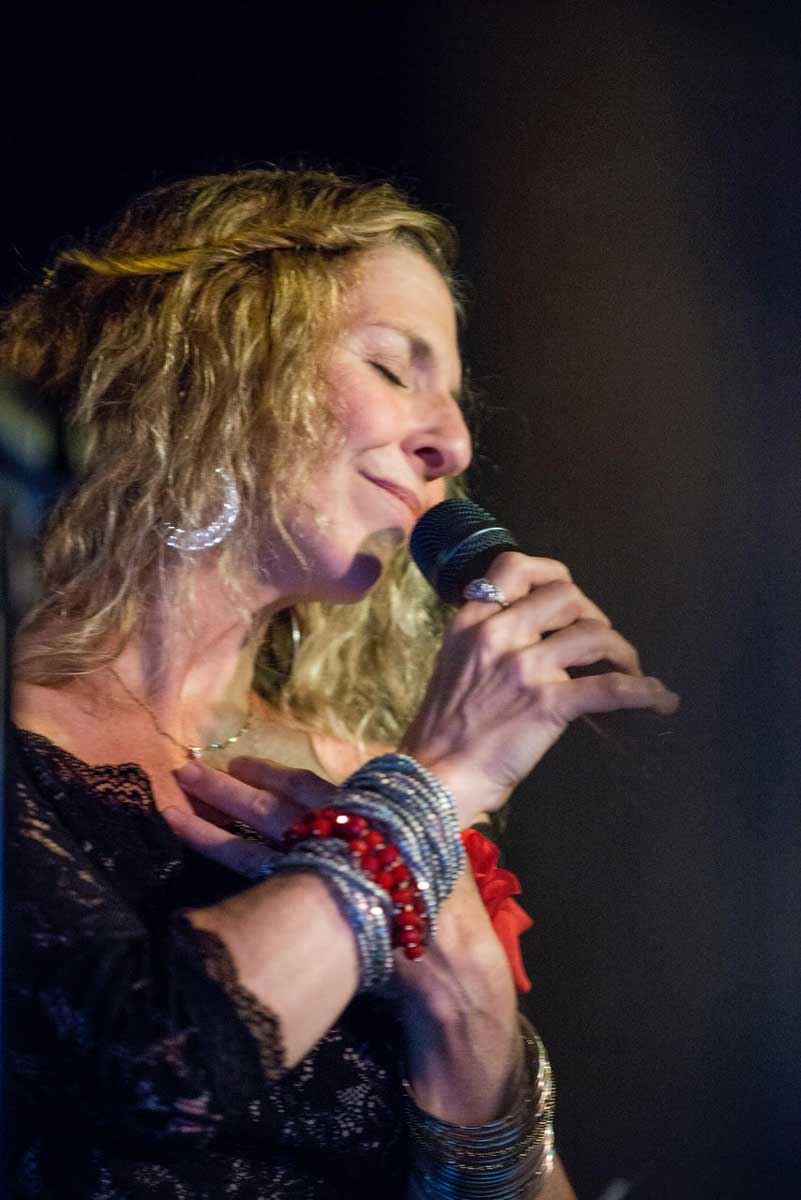
Jazz vocalist Suzi Stern performs, smiling.
And she draws on the chord changes. She hums, shifting from whole notes to fine shades of tone, minor diminished chords. The scales are almost Arabic sounding at times, she said. The music holds the influence of 700 years of Arabic culture across the country — suggesting a kinship with Romani and Gitano and Andalusian music in Southern Spain.
‘The music breathes, and you go back into rhythm.’
The music can cary a sense of sadness and solitude, lightened with dreaming and joy — a sense of intimacy in the past and an expanse of unknown future — loving someone, missing them, knowing them, imagining reunion. In Portuguese, that feeling comes in one word, saudade. And then fado can leap into Coimbra, a genre played with vigorous energy, named for the city at its center.
“It’s mostly sung by men,” she said, “but they’re changing that. Yay! Finally, that’s what I said to the (man in Portugal) who told me this. He said, ‘Yes, there you know people, women are singing the music from Coimbra. … It’s more upbeat.”
She had met him only a few days before, listening to music in Lisbon. In the Alfama she explored Fado Museum, absorbed by 12-string Portuguese guitars, beautifully carved and old, and challenging … maybe one or two people in New York can play them, she said.
And she slipped into Amalia Rodriguez’s house on the last day of her trip, an hour before closing. The house has become a museum now in Rodriguez’ memory.
“She was a beautiful singer, “ McSweeney said, “very natural. She had no training. She didn’t play any instruments. It was just natural for her.”
Rodriguez toured the world — she played a Lincoln Center, McSweeney said. The long silk gowns she designed for her performances still hang in her closet here. Old LP records line the walls, and paintings of her from longtime fans. And her parrot still lives in the kitchen, talking to people who walk in.

